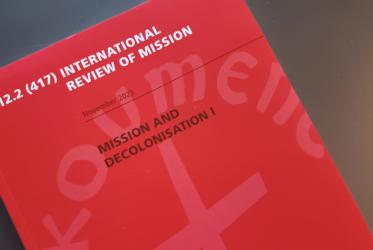A new World Council of Churches (WCC) document on mission and evangelism was part of the presentations and discussions at the recent 9-day European ecumenical study course in Josefstal, Bavaria, Germany.
The 23-page document, which offers new directions and concepts regarding the practice of mission and evangelism, will be tabled at the upcoming WCC 10th assembly in Busan, Republic of Korea, from 30 October to 8 November.
About 40 participants from Protestant, Orthodox, Roman Catholic and Anglican churches from all over Europe participated in the annual course and explored the document called "Together Towards Life: Mission and Evangelism in Changing Landscapes".
During a presentation about the document, Kyriaki Avtzi, the WCC’s programme executive on evangelism, said these changing concepts and directions explain the meaning of "mission in the Spirit" which gives a dynamic, transformative drive to our participation in God's mission.
One dimension of this is the role of discerning the role of the Holy Spirit in life-affirming understandings of wisdom and culture, and how this transforms the expression of evangelism, urging openness, respect and acceptance of others in a spirit of Christian love and humility.
Life-affirming mission spirituality underlines the presence and the important role of the Spirit of God "wherever life in its fullness is affirmed in all its dimensions including liberation of the oppressed, healing and reconciliation of broken communities and the renewal of all creation."
Within the contemporary multi-centered and multi-directional global frame of mission, the document points toward mission from the margins, which assumes a prominent prophetic role. As Jesus embraced those who were marginalized in his time, an inextricable aspect of the churches’ mission today is the commitment to work for justice and inclusivity, and towards peace and reconciliation.
In the discussion following the presentation, many members of the group expressed agreement with the document’s insights. Norbert Stapfer, a Lutheran pastor in Bavaria, said it is remarkable that theologians and scholars with different doctrinal backgrounds succeeded in working together on the topic of mission which historically been a subject of vigorous debate.
Avtzi highlighted the principle that a primary purpose of the mission document is to inspire and initiate new approaches to mission and evangelism practices on the ecclesial, institutional and educational levels.
To this end, a Practical Guide on the New Affirmation has been compiled and will be published in time for the WCC assembly at Busan, with the goal of facilitating further reflection on and re-shaping of mission and evangelism practices.
“Together towards life: Mission and Evangelism in Changing Landscapes”







